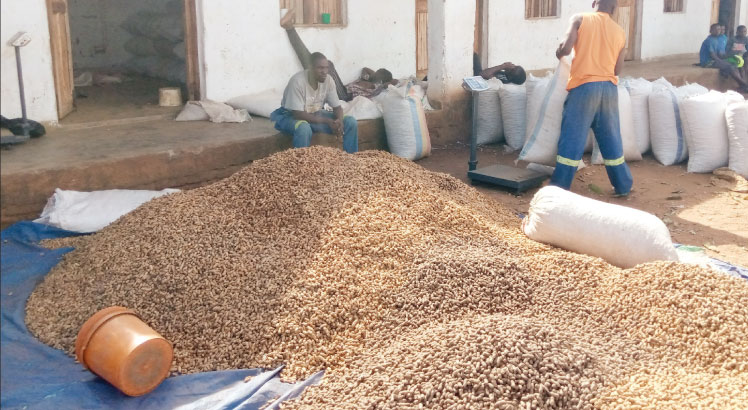Putting 2012 forex, fuel shortages in perspective
 Malawi has, in recent years, been experiencing the shortage of foreign currency in the formal financial market.
Malawi has, in recent years, been experiencing the shortage of foreign currency in the formal financial market.
The acute shortage of foreign currency peaked in 2009 when the country’s reserves were significantly depleted by the lagged effect of the 2008 surge in the world fuel and fertiliser prices which bloated the country’s import bill.
Since then, the country has seen its foreign reserves sinking below the internationally recommended three months threshold of import cover.
Foreign exchange shortage has had a serious multiplier effect, triggering the shortage of fuel. Thus, 2012 saw both foreign exchange and fuel reserves dwindling.
Such being the case, wholesale and retail trade growth as well as the manufacturing sector continued to suffer under the combined burden of the same foreign exchange shortages and unreliable utility and fuel supplies.
Compounding the crises has been the slump by 40 percent in the proceeds from tobacco, Malawi’s mainstay, which sank to $177 million (K60 billion) in 2012 from about $292 million (K99 billion) in 2011.
In the year, Malawi President Joyce Banda introduced a number of economic reforms including an austerity budget, devaluation and floatation of the kwacha, reintroduction of the automatic pricing mechanism (APM) on fuel, deregulation of water and electricity tariffs.
Fuel, forex shortages
The 2012 annual economic report, prepared by the Ministry of Economic Planning and Development crowned it all, saying a number of companies operated at minimal level in the first half of 2012.
This simply means that the country’s manufacturing sector is still on the sick bed taking into account a number of challenges taking place in the sector including foreign exchange and fuel shortages and power interruptions.
As the year wound up, some manufacturers were still finding it tough to import raw materials, machinery and spare parts, among others.
The manufacturing sector grew by 1.7 percent in 2011 compared to 2.2 percent registered in 2010, a clear indication of how the sector has struggled.
With the rampant unemployment, shrinking and collapsing manufacturing sector, is it possible to resuscitate the economy?
The Malawi Confederation of Chambers of Commerce and Industry (MCCCI) chief executive officer Chancellor Kaferapanjira explained last year that most businesses were being hurt, but was positive that the situation would be improved in the long run.
Kaferapanjira said MCCCI believes that the painful reforms being implemented will soon start bearing fruits for the private sector after helping to stabilise the economy.
This week, MCCCI, through a published statement assessing the year and providing an outlook, has also noted that there were critical shortage of foreign exchange, intermittent and erratic supply of fuel and decreasing supply of most commodities.
“Fuel is also available, even if it is at a higher price and sometimes irregularly available. More importantly, businesses are able to run. Foreign exchange is also available, again sporadically, but the fact is that factories are running. It will, however, take Malawi itself to generate its own foreign exchange for the country to be self-sufficient in foreign exchange supply,” he said.
But Alliance Capital Limited, independent registered portfolio and investment firm warned during the year that economy was unlikely to stabilise soon on account of several variables on the ground.
Low donor inflows
The company’s warning was on the premise that donor inflows, accounting for about 30 percent of the total national budget, would delay as it would undergo ‘usual bureaucratic processes’, hence derailing recovery process.
Government is keeping its fingers crossed that Malawi economy stabilises within the 18-month time frame.
“Malawians need to brace themselves for harder times ahead as the economy is unlikely to stabilise soon. Significant inflows may only be witnessed towards the end of the year to allow for the usual bureaucratic processes,” said the firm.
Donors are an important source of foreign currency and anchor the country’s Balance of Payments (BoP) and any delay or suspension in donor inflow triggers serious consequences in the country’s economy.
The country, in 2012, also witnessed a spate of labour unrests which experts argued would have a lagged effect of slowing down the economy further as production in most companies was abruptly halted.
Nico Asset Managers Limited argued towards the end of the year that ongoing strikes pose a threat to the attainment of high gross domestic product (GDP) growth rate, saying with employees on strike, companies will experience loss of sales, reduced profits and eventually reduced shareholder yields, which is counter to stabilise the economy anytime soon.
This week, a government economist did not hide his pessimism about economic recovery, arguing most macroeconomic indicators are in red.
“As it stands now, foreign currency is still scarce. Although fuel supply seems to have somehow stabilised, indications are that in 2013 queues will resurface. In a nutshell, talk of recovery should be halted until at least December 2013,” said the economist.
The President, however, still maintains that she does not need extra time to recover the ailing economy despite most indicators pointing the other direction.
Banda, speaking through her press secretary Steven Nhlane, said last week that some of the signals of recovery will include attaining a stable inflation rate, maintain constant fuel supply and also improving foreign exchange reserves.
Finance Minister Dr. Ken Lipenga, in a recent interview, sounded confident with recovery prospects, and challenged skeptics to ensure providing constructive criticisms on how government can effectively improve on some of the challenges.
“Malawi can and will recover. We have experienced high growth in the recent past. I believe that the economic reform programme that we have embarked on will create the correct economic fundamentals for economic recovery and growth.
“In a matter of a few months, we will begin to see these reforms beginning to bear fruit. However, it will take time for the economic reform programme to lead to sustainable growth and poverty reduction,” he explained.





